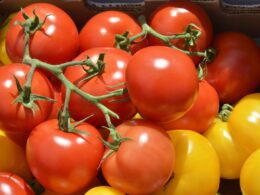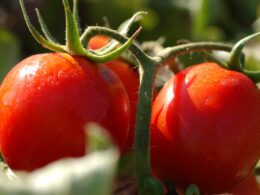Understanding Epsom Salt
Imagine sprinkling a magical substance on your garden that could boost the growth and overall health of your favorite plants, like the plump tomatoes and crisp cucumbers you’re so proud of. This ‘magic’ ingredient is actually Epsom salt, a natural compound made up of magnesium, sulfur, and oxygen. You may have already used it for soothing sore muscles or adding to your bathwater for relaxation, but did you know it can also work wonders in your garden? Epsom salt helps improve plant growth by providing essential nutrients that might not always be available in the soil. Magnesium plays a crucial role in photosynthesis – the process through which plants convert sunlight into energy – while sulfur helps produce amino acids and vitamins needed for proper plant development. Because Epsom salt is highly soluble in water, it’s easily absorbed by plant roots when dissolved and applied to the soil or foliage. So next time you’re tending to your beloved tomato and cucumber plants, consider giving them a little boost with Epsom salt. By doing so, you’ll help ensure they get all the nutrients they need to grow strong and healthy. And as an added bonus? You’ll likely see more vibrant colors and better-tasting fruits come harvest time!The Role of Magnesium and Sulfur in Plant Growth
You might not realize it, but magnesium and sulfur play crucial roles in helping your plants thrive! These two essential nutrients are responsible for various vital functions that promote the growth and health of your tomato and cucumber plants. Let’s explore how magnesium and sulfur contribute to their well-being.- Magnesium: This mineral is a key component of chlorophyll, the green pigment responsible for photosynthesis. It helps plants capture sunlight and convert it into energy needed for growth. Additionally, magnesium aids in the synthesis of proteins, strengthens cell walls, and improves nutrient uptake.
- Sulfur: Sulfur is a component of certain amino acids (the building blocks of proteins) and vitamins necessary for plant growth. It plays a role in producing enzymes that help with metabolism while also contributing to the formation of chlorophyll. Furthermore, sulfur strengthens plant defenses against pests and diseases.
Potential Benefits of Epsom Salt for Tomatoes and Cucumbers
It’s worth delving into how this simple yet powerful compound can significantly boost the health and productivity of your tomato and cucumber plants, isn’t it? Epsom salt is known to provide essential nutrients like magnesium and sulfur, which play a crucial role in photosynthesis, fruit production, and overall plant growth. By applying Epsom salt to your garden, you’re essentially giving your plants much-needed nourishment that they may not be getting from the soil alone. This extra boost helps them grow healthier and more resistant to pests and diseases, making your garden safer for both the plants and you. When it comes to tomatoes and cucumbers specifically, Epsom salt has been shown to improve fruit quality by increasing sweetness while reducing bitterness. It also enhances their coloration – making those reds more vibrant in tomatoes or greens deeper in cucumbers. Additionally, using Epsom salt can prevent blossom end rot in tomatoes – a common issue faced by many gardeners where the bottom of the fruit turns black due to calcium deficiency. As for cucumbers, Epsom salt aids in producing strong vines with abundant foliage that provides better support for growing fruits. So go ahead and give your tomato and cucumber plants a helping hand with some Epsom salt. Simply dissolve about one tablespoon of Epsom salt per gallon of water, then use this solution as a foliar spray or pour it directly around the base of your plants every few weeks during the growing season. The results will speak for themselves: healthier plants with sweeter fruits that are sure to make you feel even more secure about what you’re bringing into your home from your own backyard oasis!Should I Use Epsom Salt When Planting Tomatoes?
Using Epsom salt when planting tomatoes has been a debatable topic among gardeners. Some believe that incorporating Epsom salt into the soil can result in healthier and more productive plants. However, scientific evidence supporting this claim is lacking. While Epsom salt may provide magnesium and sulfur, essential nutrients for plant growth, its impact on tomato plants is inconclusive. It is advisable to consult local horticultural experts or conduct proper research before deciding to experiment with planting tomatoes with epsom salt.









